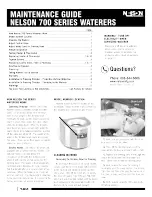
SAFETY INSTRUCTIONS
Before Getting Started
2
Risk of severe injury or death by
electrical shock.
•
To reduce risk of electrical shock, disconnect power before
working on or around the system. More than one discon
-
nect switch may be required to de-energize the equipment
before servicing.
•
Wire pump system for correct voltage.
•
Be certain that this pump is connected to a circuit
equipped with a ground fault circuit interrupter (GFCI)
device if required by code.
•
Check electrical outlets with a circuit analyzer to ensure
power, neutral, and ground wires are properly connected. If
not, a qualified, licensed electrician should correct the
problem.
•
Some pumps are supplied with a grounding conductor and
grounding-type attachment plug. To reduce risk of electric
shock, be certain that it is connected only to a properly
grounded grounding-type receptacle. Do not remove the
third prong from the plug. The third prong is to ground the
pump to help prevent possible electric shock hazard.
•
Some pumps are supplied with lead wires and are intended
to be hardwired using a junction box or other approved
enclosure. The pumps include a grounding connector. To
reduce risk of electric shock, be certain that it is properly
connected to ground.
•
In a 230 V direct wire installation, one side of the line going
to the pump is always electrically energized, regardless of
whether the liquid level control switch is open or closed. To
avoid hazards when installing or servicing, install a double-
pole disconnect near the pump installation.
•
The flexible jacketed cord assembly mounted to the pump
must not be modified in any way, with the exception of
shortening the cord to fit into a control panel. Any splice
between the pump and the control panel must be made
within a junction box and comply with the National Electri
-
cal Code.
•
Check local electrical and building codes before installa
-
tion. The installation must be in accordance with their reg
-
ulations as well as the most recent National Electrical Code
(NEC) and the Occupational Safety and Health Act (OSHA).
•
Do not use the power cord for lifting the pump.
•
Do not use an extension cord.
•
The pump should only be used with liquids compatible
with pump component materials. If the pump is used with
liquids incompatible with the pump components, the liquid
can cause failure to the electrical insulation system result
-
ing in electrical shock.
Risk of bodily injury, electric shock,
or equipment damage.
•
This equipment must not be used by children or persons
with reduced physical, sensory or mental abilities, or lack
-
ing in experience and expertise, unless supervised or
instructed. Children may not use the equipment, nor may
they play with the unit or in the immediate vicinity.
•
Equipment can start automatically. Lockout-Tagout before
servicing equipment.
•
An inoperative or malfunctioning pump could lead to
flooding, resulting in personal injury or property damage.
•
Operation of this equipment requires detailed installation
and operation instructions provided in this manual for use
with this product. Read entire manual before starting
installation and operation. End User should receive and
retain manual for future use.
•
Keep safety labels clean and in good condition.
•
Keep work area clean, well-lit, and uncluttered.
•
Wear safety glasses while installing or performing mainte
-
nance on the pump.
Risk of damage to pump or other equipment.
•
Before installing pump, allow air conditioner to cycle sev
-
eral times, collecting condensate in a separate container to
help flush any residual oils that may remain in the system.
Failure to flush the system can result in damage to the
pump and drain line plumbing components.
•
When operating in a gas furnace environment, care must
be taken to ensure acidity of condensate does not fall
below the average pH of 3.4 (to prevent a localized pocket
of acid that acts like a battery causing pitting) by routinely
cleaning or flushing tank with fresh water.
•
Support pump and piping when assembling and when
installed. Failure to do so may cause piping to break, pump
to fail, motor bearing failures, etc.
•
Do not install the pump in a manner that will subject it to
splashing or spraying.
•
Periodically inspect pump and system components. Regu
-
larly check hoses for weakness or wear, making certain that
all connections are secure.
•
Schedule and perform routine maintenance as required
and in accordance with the Maintenance section of this
manual.
•
Pump is for indoor use only.



































